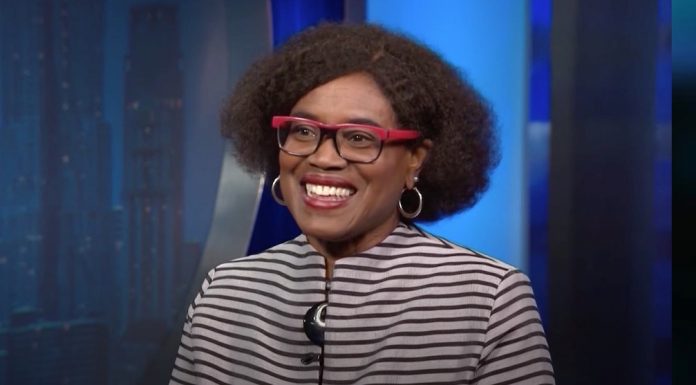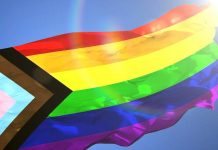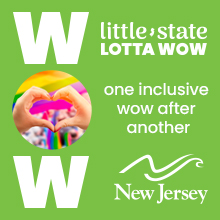[This article by Rev. Irene Monroe appears in the current Sept./Oct. 2020 issue of Boston Spirit magazine. Subscribe for free today.]
Shared Struggles, Common Foes
When civil rights icon US Rep. John Lewis’s hearse made a lengthy stop at a rainbow crosswalk in downtown Atlanta, it was his last symbolic gesture to LGBTQ+ Americans to keep fighting, albeit posthumously. Lewis’s decades-long jeremiad invited Americans to get into “good trouble” meant advocating for LGBTQ+ civil rights, too. His advocacy for LGBTQ+ rights was informed and shaped during his formative years in the 1960s Civil Rights Movement, understanding all human rights need protection.
Moreover, Lewis saw the African American civil rights struggle inextricably tied to the LGBTQ+ civil rights battle because both have a shared history of struggle, violence and police brutality. However, we have not been staunch allies of one another. And, it is an ongoing heartbreak for me and others who intersect both communities. The LGBTQ+ liberation movement has piggybacked on the strides and gains African Americans have made against discrimination. The playbook of the 1960s Black Civil Rights Movement profoundly shaped and informed the LGBTQ+ movement from street protests to courtroom battles.
Before the Stonewall Rebellion, the Mattachine Society staged a “Sip-In” in 1966, modeling the Civil Rights Movement’s sit-ins that challenged segregated lunch counters in the South. Dick Leitsch, then-chairman of the New York Mattachine Society, and other gay activists walked into Julius’ Bar, located a block northeast of the Stonewall Inn. They handed a waitress their statement that announced: “We are homosexuals. We believe that a place of public accommodation has an obligation to serve an orderly person, and that we are entitled to service so long as we are orderly.” The sip-in’s success resulted in the following year with the New Jersey Supreme Court rule stating “well-behaved homosexuals” could not be barred from a drink.
Reinforcing love
Marriage equality was a hotly contested issue for evangelical and conservative ministers throughout the country. The loudest opponents in Massachusetts were African American ministers. As a counterpunch to homophobic Black ministers in Greater Boston on marriage equality, Lewis penned an October 23, 2003 op-ed in the Boston Globe titled “At a crossroads on gay unions.” His statement highlighted the connection between black and LGBTQ+ civil rights struggles:
“I’ve heard the reasons for opposing civil marriage for same-sex couples. Cut through the distractions, and they stink of the same fear, hatred and intolerance I have known in racism and in bigotry.”
On May 17, 2004, marriage equality became legal throughout the Commonwealth. Also, on that day was the 50th anniversary of the historic US Supreme Court case of “Brown v. Board of Education,” a ruling that upended this country’s “separate but equal” doctrine, adopted in the “Plessy v. Ferguson” decision of 1896. The day was chosen to signal to other states that offering same-sex couples civil unions was a “separate and unequal” system of domestic partnership. And, it was not only blatantly discriminatory, but unconstitutional, too.
This June was the fifth anniversary of “Obergefell v. Hodges,” the historic U.S. Supreme Court ruling legalizing same-sex marriage in all 50 states. The case was built on the landmark Supreme Court case Loving v. Virginia in 1967, which struck down anti-miscegenation laws as unconstitutional. The Lovings were indicted by a Virginia grand jury in October 1958 for violating the state’s Racial Integrity Act of 1924. Lending her support to the marriage equality battle in 2007, a year before she died, Mrs. Mildred Loving wrote the following:
“I am proud that Richard’s and my name are on a court case that can help reinforce the love, the commitment, the fairness and the family that so many people, black or white, young or old, gay or straight, seek in life. I support the freedom to marry for all. That’s what Loving and loving, are all about.”
Upending antidiscrimination
Also, this June, the passing of Title VII of the 1964 civil rights act prohibiting discrimination in the workplace based on sexual orientation or gender identity came as a welcoming surprise for us. One of the most crucial legislation passed was the Civil Rights Act of 1964, upending many discriminatory statues that once targeted African Americans are now going after LGBTQs.
In Jim Crow America, restrooms were a hot-button issue as today. The Civil Rights Act of 1964 outlawed discrimination based on national origin, race, hue, gender and religion. The law mandated desegregation of all public accommodations such as lunch counters, water fountains, libraries, gas stations, theaters, including bathrooms. Signs that read “whites only” prohibited entry. Black and white bathrooms were outlawed with the Civil Rights Act of 1964. But the struggle for bathroom rights put transgender rights front and center.
The Obama administration expanded the Civil Rights Act of 1964 to protect LGBTQ Americans. However, Trump’s administration revoked federal guidelines permitting transgender students from using “gender-appropriate facilities,” which aligned with their gender identity. His base, mostly white evangelicals, have always been a demographic group obsessed with policing this nation’s genitals. They feel comfortable with ordinances that mandate what they do, how we use them, what body orifices they enter and—now with transgender Americans—where they go relieve theirs. Sex-segregated public toilets are not banned in all 50 states. However, Massachusetts voters upheld transgender rights, including bathrooms with the Yes on 3 campaign in 2018.
One of LGBTQ’s earlier battles for inclusion is the military. It strains incredulity, knowing that a segregated military existed since the American Revolution up until 1948. In 2017 President Trump’s ban on transgender service members to the present was eerily reminiscent of the military’s racially segregated ranks. In his inimitable style of communicating the order, it came in the form of a tweet. Ironically, Trump’s tweet came on the 69th anniversary of President Harry Truman’s executive order racially desegregating the U.S military in 1948.
Confronting systemic racism
With such similarity in both LGBTQ+ and African American’s battles for civil rights, what keeps the internecine arguments among us persistent and seemingly impenetrable?
My answer: Persistent racism. Unchecked white privilege. Single-issue platforms.
In the battle for LGBTQ+ equality, people of color are nonessentials except for photo-ops, highlighting diversity. When Proposition 8 passed, the white LGBTQ community blamed California’s black community for its win at the ballot box, despite the fact the black community was less than 10 percent, and its white population was approximately 60 percent. When white LGBTQ+ coined the catchy phrase “Gay is the new black,” they ignored their privilege to do so. As Boston Pride revs up each June, the fault lines along race, class and gender identity emerge, too.
The continued distance between the white LGBTQ+ community and LGBTQ+ of color has a historical antecedent: Stonewall and the white community’s continued dominance and control of its history.
That event and today’s protests illustrate how Black and LGBTQ+ civil rights are tied to a shared history of police brutality. As a child of the 1960s Black civil rights movement, I went with a crowd from Brooklyn to Greenwich Village, the first night of the riots at the request of my friend Birdie’s father. Birdie was the lead vocalist at our church choir. That night, when we got the news that white cops were beating up Black gay men at a bar called Stonewall, Birdie’s father, Nate Sr., asked us to help find. It’s those brown and black LGBTQ people, like me, who are absent from that night’s photos, but are also bleached from the written history.
This June, Pride took place in the midst of a global pandemic and protests against police brutality and racial inequality. George Floyd’s death appears to be an inflection point and wake-up call for white America. Instead of a Pride parade in Boston, the Trans Resistance Vigil and March stood in its place. The death of George Floyd, a cisgender male, symbolizes the new face of anti-black violence, as Matthew Shepard’s face came to symbolize homophobic violence after his murder in 1998. However, black trans death—two occurring since Floyd’s death had been murdered—is disproportionately higher than any marginalized group. For the first time ever, this Pride month, LGBTQ+ communities and organizations across the country elevated the voices and faces of its black communities. For some LGBTQ+ people of African descent, however, the gesture was at best too late, and at worst, a clear sign of tokenism—seizing the moment to be politically correct.
As a community, we have racked up an impressive list of civil rights victories since Stonewall. The infighting that goes on in our LGBTQ+ communities is all symptoms of what’s broken in us. Change is our shared responsibility. Moving forward in the aftermath of Floyd’s death, I hope the entire LGBTQ+ community embraces intersectional concerns and goals to best address systemic racism and police violence, which both communities—African American and LGBTQ+—share.
Rev. Irene Monroe can be heard on the podcast and standing Boston Public Radio segment “All Rev’d Up” on WGBH (89.7 FM), the Boston affiliate of NPR. Monroe’s syndicated religion columns appear in Bay Windows, Cambridge Chronicle, Dig Boston, Curve and in several cities across the country and in the UK and Canada. Monroe is the Boston voice for Detour’s African American Heritage Trail and History UnErased. Also, Monroe is a founder and now member emeritus of several national LGBTQ+ Black and religious organizations. As an activist Monroe has received numerous awards. Her papers are at the Schlesinger Library at Radcliffe College’s Research Library on the History of Women in America. Monroe’s book on the reported topic will be published in 2021.
Not a subscriber? Sign up today for a free subscription to Boston Spirit magazine, New England’s premier LGBT magazine. We will send you a copy of Boston Spirit 6 times per year and we never sell/rent our subscriber information. Click HERE to sign up!











